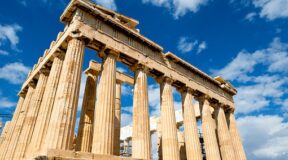Greece is a country rich in history, culture, and natural beauty, offering a wide range of attractions for visitors. Here’s a detailed look at some of the top tourism attractions across Greece:
Major Cities:
Greece is a country rich in history cities such:
Athens
- Acropolis and Parthenon: The ancient citadel on a rocky outcrop above Athens, featuring the Parthenon, a symbol of classical Greece.
- Acropolis Museum: A modern museum housing artifacts from the Acropolis.
- Ancient Agora: The central public space in ancient Athens, including the Temple of Hephaestus.
- National Archaeological Museum: Greece's largest museum, with extensive collections of Greek antiquities.
- Plaka: The old historical neighborhood of Athens, known for its narrow streets, cafes, and shops.
Thessaloniki
- White Tower: A symbol of Thessaloniki, offering panoramic views of the city.
- Rotunda: A massive round building that has served as a mausoleum, church, and mosque.
- Archaeological Museum of Thessaloniki: Houses artifacts from Macedonia, including the gold finds from Vergina.
- Ano Poli: The old upper town, known for its traditional houses and Byzantine walls.
Delphi
- Temple of Apollo: Where the Oracle of Delphi prophesied.
- Delphi Archaeological Museum: Showcases important artifacts from the ancient site.
- Tholos of Delphi: A circular building at the sanctuary of Athena Pronaia.
Greek Islands
Santorini
- Fira and Oia: Known for their stunning caldera views, white-washed buildings, and vibrant sunsets.
- Red Beach: Famous for its red volcanic sand and cliffs.
- Ancient Thera: The ruins of a city dating back to the 9th century BC.
Mykonos
- Little Venice: A charming district with houses built right on the water.
- Windmills: Iconic structures offering picturesque views.
- Delos Island: A nearby archaeological site, considered the birthplace of Apollo and Artemis.
Crete
- Knossos Palace: The center of the Minoan civilization, with impressive frescoes and ruins.
- Samaria Gorge: A national park offering spectacular hiking opportunities.
- Elafonissi Beach: Known for its pink sand and clear waters.
Rhodes
- Old Town of Rhodes: A UNESCO World Heritage site with medieval architecture.
- Palace of the Grand Master: A medieval castle and museum.
- Lindos Acropolis: An ancient acropolis with stunning views over the sea.
Corfu
- Corfu Town: A UNESCO World Heritage site with Venetian, French, and British influences.
- Achilleion Palace: A palace built by Empress Elisabeth of Austria with beautiful gardens.
- Paleokastritsa Beach: Known for its crystal-clear waters and scenic beauty.
Mainland Attractions
- Meteora: Monasteries perched on top of towering rock formations, offering stunning views and spiritual serenity.
- Olympia: The birthplace of the Olympic Games, with ruins of ancient athletic facilities and temples.
- Mycenae: An ancient city with significant archaeological remains, including the Lion Gate and royal tombs.
- Epidaurus: Famous for its ancient theater with exceptional acoustics.
Peloponnese
- Nafplio: A charming seaside town with Venetian architecture and historical significance.
- Monemvasia: A medieval fortress town on a small peninsula.
- Ancient Corinth: Ruins of a powerful city-state, including the Temple of Apollo.
Cultural Experiences
- Greek Cuisine: Enjoy traditional dishes such as moussaka, souvlaki, tzatziki, and fresh seafood. Don’t miss local wines and olive oil.
- Festivals: Experience Greek culture through festivals such as:
- Easter Celebrations: Particularly notable in Corfu and other parts of Greece.
- Athens and Epidaurus Festival: Featuring performances of ancient drama in historic venues.
- Music and Dance: Traditional Greek music and dance performances, often found in local tavernas and during festivals.
Beaches and Outdoor Activities
- Navagio Beach (Zakynthos): Known for its shipwreck and stunning blue waters.
- Myrtos Beach (Kefalonia): Famous for its turquoise waters and white pebble shore.
- Sailing and Yachting: Explore the Greek islands by boat, a popular way to experience the coastline.
- Hiking: Numerous trails across the country, including the E4 European long-distance path and trails on Mount Olympus.
Practical Tips
- Language: Greek is the official language, but English is widely spoken in tourist areas.
- Currency: The Euro (EUR) is used.
- Transportation: Greece has a well-developed public transport system, including ferries between the islands, buses, and trains on the mainland.
Best Time to Visit
- Summer (June to August): Ideal for beach holidays, but it’s also the peak tourist season.
- Spring (April to June) and Autumn (September to October): Best for sightseeing with pleasant weather and fewer crowds.
- Winter (November to March): Suitable for cultural tourism and experiencing local life, with fewer tourists around.
Greece offers a unique blend of ancient history, vibrant culture, and natural beauty, making it a top destination for travelers of all interests.
Discover Greece: https://touristshadi.com/greece/


